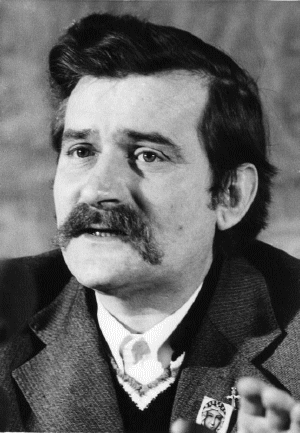 SKC Films Library SKC Films Library |
| SKC Films Library >> Economics >> Labor >> Trade and Labor Unions |
| Lech Walesa [lek vah wenz' ah] leader of Poland's Solidarity Movement, first President of the Republic of Poland
Lech Walesa was born in Popowo, Poland, on September 29, 1943. After graduating from vocational school, he worked as a car mechanic at a machine center (1961-1965). He then served two years in the army, rising to the rank of Corporal before being discharged. In 1967 he was employed in the Gdansk shipyards as an electrician. In December 1970 workers at the Lenin Shipyard went on strike. A clash with government officials ensued, and Walesa was one of many workers who were briefly detained. In 1976 he was fired for his role in organizing new protests. Employed only intermittenty during the next four years, he intensified his efforts to organize free non-communist trade unions. In August 1980 Walesa led a strike at the Gdansk shipyard; that strike gave rise to a wave of strikes over much of Poland. Forced to negotiate, Polish authorities signed the Gdansk Agreement of August 31, 1980, which gave Polish workers the right to strike and to organize their own independent union. The Catholic Church supported the Solidarity movement, and in January 1981 Walesa was received by Pope John Paul II in the Vatican. From 1980 to 1981, Walesa traveled to Italy, Japan, Sweden, France, and Switzerland as a guest of the International Labor Federation. In September 1981 he was elected Solidarity Chairman at the First National Solidarity Congress in Gdansk. Amidst fears of Soviet intervention and mounting economic pressures, the Polish government suspended Solidarity and imposed martial law in December 1981; Walesa was arrested and held under house arrest. In November 1982 Walesa was released and reinstated at the Gdansk shipyard. Although he was kept under constant surveillance, Walesa was able to maintain contact with other Solidarity leaders, most of whom had gone underground. Martial law was lifted in July 1983, but many of the restrictions were continued in the civil code. Solidarity's cause gained a much-needed boost in October 1983, when the Nobel Foundation announced that Lech Walesa had been awarded the 1983 Peace Prize. As economic conditions worsened, Solidarity's popularity increased. Eventually the government was again forced to negotiate with Walesa and Solidarity. The result was the holding of parliamentary elections which led to the establishment of a non-communist government. Walesa then began a series of meetings with world leaders. In November 1989 he became only the third non-American in U.S. history to address a joint session of the United States Congress (the other two being the Marquis de Lafayette and Winston Churchill). In April 1990 Walesa was elected chairman of the Solidarity Union. In December 1990 Walesa was elected President of the newly-established Republic of Poland. Pledges to transform Poland into a market economy and eliminate unemployment encountered obstacles, and Walesa was unable to make good on either pledge. Over the course of five years Poland had five different governments, and Walesa dismissed two of them. In 1993 the Polish people expressed their disillusionment with Walesa's coalition government by electing a majority of former Communists to Parliament. In July 1994 Walesa vetoed a law that would have liberalized Poland's strict abortion laws. Despite his decreased popularity, Walesa ran for re-election in November 1995, and was soundly defeated. In addition to the Nobel Peace Prize, Walesa has also received the United States Medal of Freedom, Norway's Award of the Free World, and the European Award of Human Rights. Although officially retired from Polish politics, Walesa continues to voice his opinions on current events and to call for reforms when he deems them necessary. The Struggle and the Triumph: An Autobiography was published in 1994. SEE ALSO |
| SKC Films Library >> Economics >> Labor >> Trade and Labor Unions This page was last updated on June 06, 2017. |
